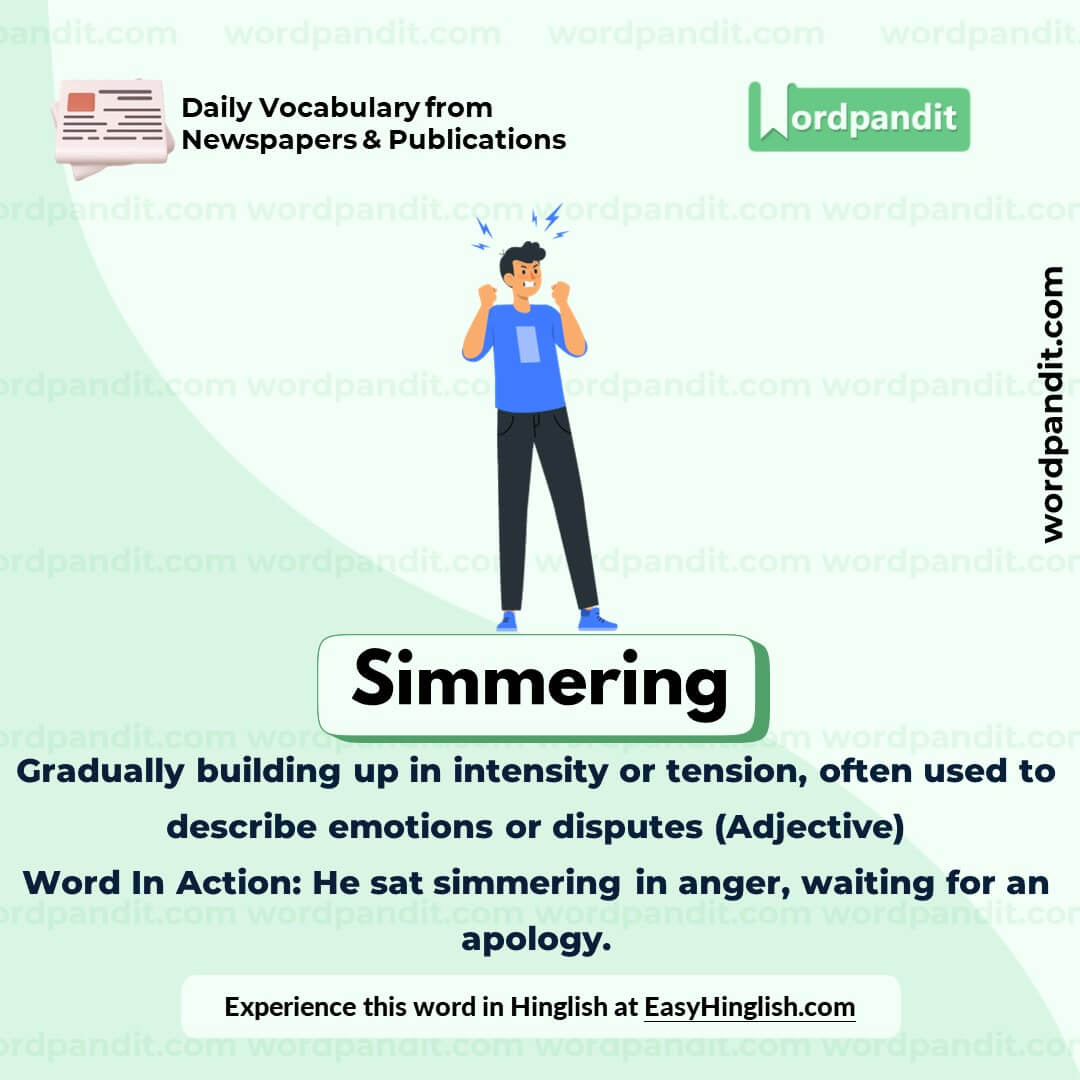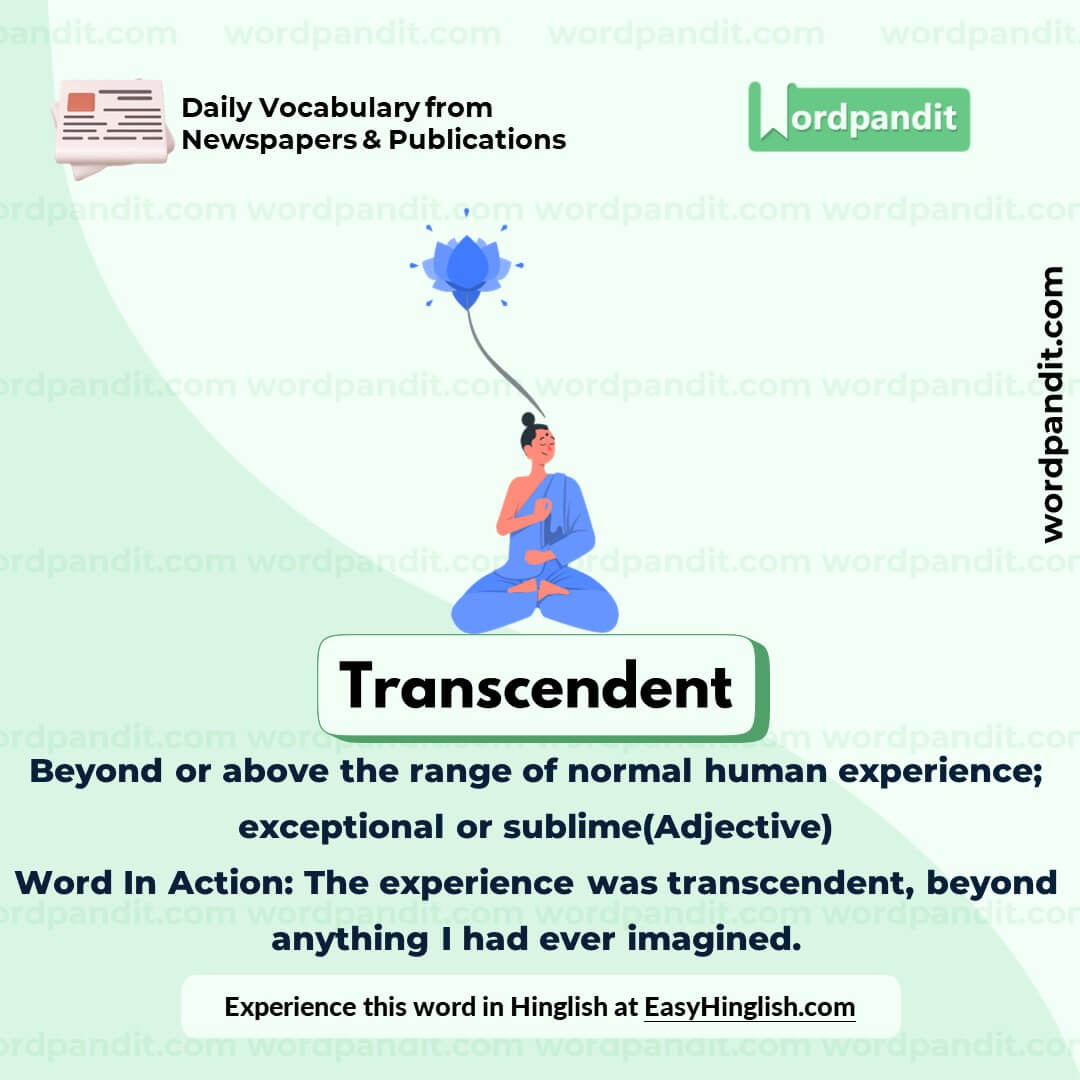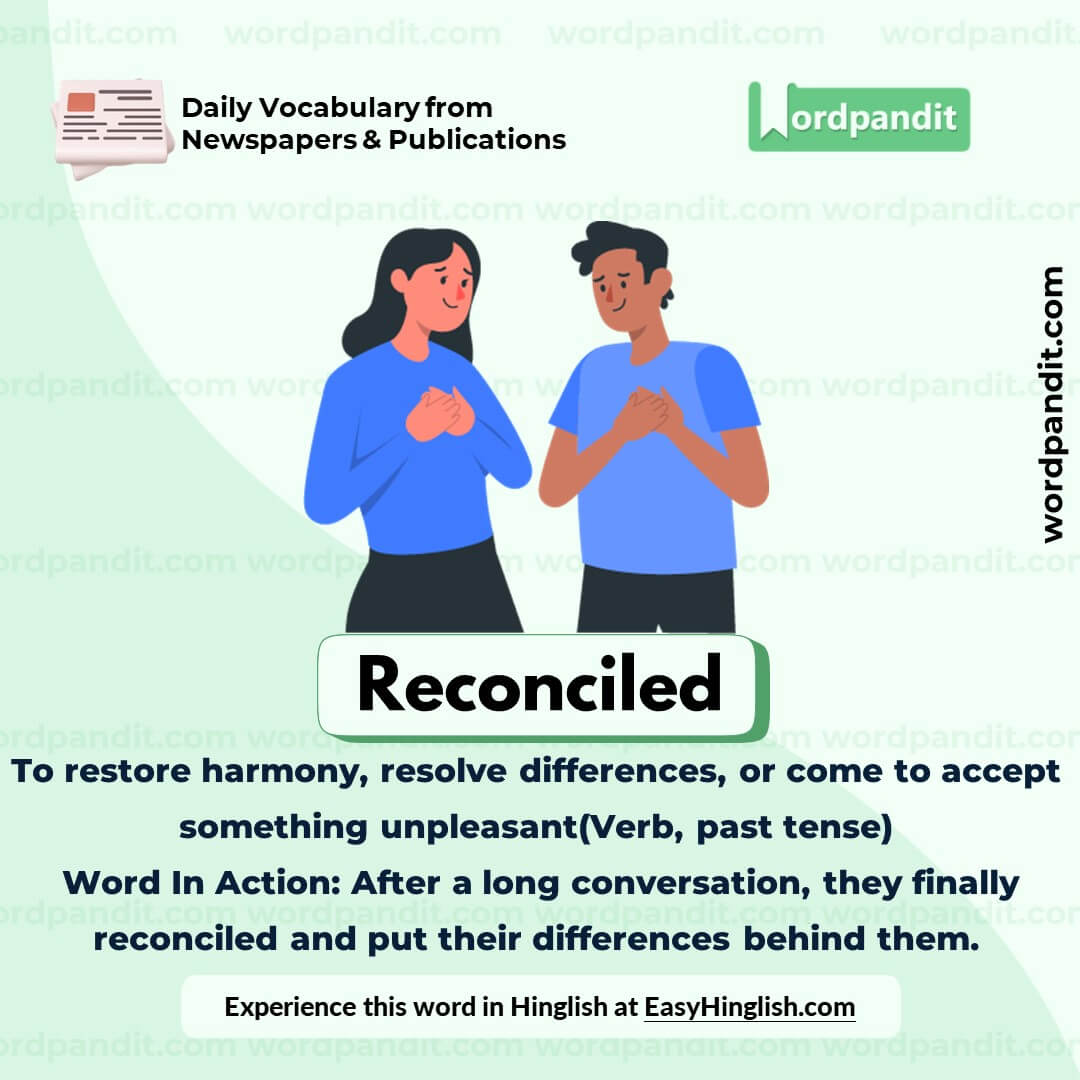Daily Vocabulary from International Newspapers and Publications
Expand Your Vocabulary with Wordpandit’s Global Vocabulary Hub
At Wordpandit, we are committed to helping you develop a truly global vocabulary by drawing from some of the most respected international publications. This section is designed to keep you ahead of the curve by introducing you to words that define global conversations and trends.
The Power of Global Sources
To help you think and communicate on a global scale, we curate vocabulary from renowned international sources, such as:
- The New York Times
- The Washington Post
- BBC
- The Guardian
- The Economist
- Scientific American
- Psychology Today
- And many more...
Stay Global, Stay Competitive
Our daily updates from international publications ensure you are consistently exposed to new words that reflect global news and developments, making sure your vocabulary is not only current but also globally relevant.
Enhance Your Global Perspective
Whether you’re preparing for international exams, aiming to excel in global business communication, or want to enhance your language skills for personal growth, Wordpandit offers the resources you need to thrive in a global context.
Effective Learning, Global Reach
Our learning methodology combines global examples, memory aids, and interactive activities, allowing you to internalize new words effectively and apply them in real-world scenarios.
Begin Your Global Vocabulary Journey Now!
Why Choose Wordpandit?
Practical Learning: Focus on words you'll actually encounter in real-world reading, enhancing your comprehension and communication skills.
Diverse Content: From current affairs to scientific breakthroughs, our varied sources expose you to vocabulary across multiple domains.
Effortless Integration: Make Wordpandit a part of your daily routine. Just a few minutes each day can significantly boost your lexicon over time.
Your Path to Vocabulary Mastery
- Visit our Daily Vocabulary section regularly
- Explore new words and their usage in context
- Practice incorporating these words into your own writing and speech
- Track your progress as your vocabulary expands
Start Your Journey Today
Embark on your vocabulary enhancement journey with Wordpandit. By consistently engaging with our daily posts, you'll build a robust vocabulary that serves you well in academic, professional, and personal contexts.
Remember, a word a day keeps linguistic limitations at bay. Make Wordpandit your daily companion in the quest for vocabulary excellence!
WORD-1: Simmering
Context:
"Pramod Kumar were expelled from the party due to a simmering dispute between them and had nothing to do with the marriage." - The Hindustan Times
Explanatory Paragraph:
The word "simmering" often refers to something that is gradually building up intensity, especially emotions or conflicts, but hasn’t yet reached a boiling point or explosion. It conveys a sense of ongoing tension or heat, metaphorically or literally.
Meaning: Gradually building up in intensity or tension, often used to describe emotions or disputes. (Adjective)
Pronunciation: SIM-er-ing
Difficulty Level: ⭐⭐ Beginner
Etymology: Derived from the verb "simmer," which comes from the Middle English word "symmeren," meaning to make gentle boiling sounds, or to stew gently just below boiling.
Synonyms & Antonyms:
Synonyms: brewing, seething, festering, stewing
Antonyms: resolved, calm, pacified, settled
Usage Examples:
- The simmering tension in the room was palpable as the two rivals avoided eye contact.
- Her simmering frustration finally boiled over during the heated debate.
- The government tried to address the simmering discontent among the protesters.
- There was a simmering excitement among the fans as they awaited the big announcement.
Cultural Reference:
"Simmering" is often used in literature and media to describe subtle but intense conflicts, such as the underlying tension in the novel "Pride and Prejudice" between Elizabeth Bennet and Mr. Darcy before their feelings come to light.
Think About It:
Why do you think simmering conflicts are often harder to resolve than overt disputes?
Quick Activity:
Write a sentence using "simmering" to describe an emotional state or situation in your daily life.
Memory Tip:
Imagine a pot on the stove that’s on low heat—it’s not boiling yet, but you can see the bubbles forming. That’s "simmering" in both cooking and emotional contexts.
Real-World Application:
In the workplace, a "simmering" dispute between colleagues may indicate unresolved issues that need to be addressed before they escalate into a major conflict.
WORD-2: Transcendent
Context:
"I wouldn't be who I am without it, but the same is true of many other experiences, horrific and transcendent and unusual and mundane. Birth and death, taxes and tacos." - Psychology Today
Explanatory Paragraph:
The word "transcendent" describes something that goes beyond ordinary limits or surpasses the usual experience, often carrying a sense of the extraordinary, sublime, or spiritual. It emphasizes the surpassing of normal human understanding or experience.
Meaning: Beyond or above the range of normal human experience; exceptional or sublime. (Adjective)
Pronunciation: tran-SEN-dent
Difficulty Level: ⭐⭐⭐ Intermediate
Etymology: From the Latin "transcendere," meaning "to climb over" or "go beyond," combining "trans" (across) and "scandere" (to climb).
Synonyms & Antonyms:
Synonyms: sublime, extraordinary, unparalleled, supernatural
Antonyms: ordinary, mundane, common, earthly
Usage Examples:
- The transcendent beauty of the sunset left everyone speechless.
- Her performance was so powerful it felt transcendent, moving the entire audience to tears.
- They described their meditation retreat as a transcendent experience that brought peace and clarity.
- The artist’s work was transcendent, capturing the essence of human emotion in every stroke.
Cultural Reference:
The concept of "transcendence" is central to many spiritual traditions, including Buddhism and Christianity, where it describes an experience or existence that surpasses the physical world and touches the divine or ultimate reality.
Think About It:
Can you recall a moment in your life that felt truly transcendent? What made it stand out from ordinary experiences?
Quick Activity:
Describe an experience or piece of art that you think deserves to be called transcendent. Why does it fit this description?
Memory Tip:
Think of "transcendent" as "transcend" + "end," symbolizing going beyond the end or limits of what’s normal or possible.
Real-World Application:
The term "transcendent" is often used in art and literature to describe works that evoke emotions or thoughts beyond the ordinary, inspiring a sense of awe or wonder.
WORD-3: Mundane
Context:
"I wouldn't be who I am without it, but the same is true of many other experiences, horrific and transcendent and unusual and mundane. Birth and death, taxes and tacos." - Psychology Today
Explanatory Paragraph:
The word "mundane" refers to things that are ordinary, everyday, or lacking in excitement. It often describes the routine or practical aspects of life, as opposed to those that are extraordinary or spiritual.
Meaning: Lacking interest or excitement; dull or ordinary. (Adjective)
Pronunciation: mun-DANE
Difficulty Level: ⭐ Beginner
Etymology: From the Latin "mundanus," meaning "worldly," derived from "mundus," meaning "world."
Synonyms & Antonyms:
Synonyms: ordinary, routine, banal, prosaic
Antonyms: extraordinary, remarkable, exciting, transcendent
Usage Examples:
- She struggled to find joy in the mundane tasks of daily life.
- Even the most mundane details of the story were brought to life by the author’s vivid descriptions.
- The movie transformed a mundane office setting into a backdrop for a thrilling adventure.
- Traveling helped her see beauty in the mundane aspects of everyday existence.
Cultural Reference:
In the movie "Groundhog Day," the protagonist is trapped in a time loop, reliving the same mundane day repeatedly, until he finds meaning and growth in the routine.
Think About It:
Why do you think people often overlook the value of mundane moments in their lives?
Quick Activity:
Write a sentence describing a mundane task in a way that makes it seem interesting or valuable.
Memory Tip:
Think of "mundane" as related to "Monday," often seen as the most routine and boring day of the week.
Real-World Application:
The word "mundane" is commonly used in storytelling or speeches to contrast the ordinary aspects of life with extraordinary or meaningful experiences, emphasizing the importance of both.
WORD-4: Validation
Context:
"I really value being able to write useful things to people who need something to comfort them, a future to hope for, and simple validation that what they're feeling is normal." - Psychology Today
Explanatory Paragraph:
"Validation" refers to the act of recognizing or affirming that someone’s feelings, opinions, or experiences are valid and worthy of respect. It often plays a crucial role in emotional well-being, as it helps individuals feel understood and accepted.
Meaning: The action of affirming or confirming the validity of someone's feelings, opinions, or worth. (Noun)
Pronunciation: val-i-DAY-shun
Difficulty Level: ⭐⭐ Beginner
Etymology: From the Latin "validare," meaning "to make valid," which is derived from "validus," meaning "strong" or "effective."
Synonyms & Antonyms:
Synonyms: affirmation, confirmation, endorsement, acknowledgment
Antonyms: rejection, dismissal, invalidation, denial
Usage Examples:
- The therapist provided her with validation, assuring her that her feelings were normal and justified.
- He sought validation for his ideas by discussing them with his colleagues.
- Social media can sometimes create a dangerous cycle of seeking external validation.
- Validation from a trusted friend helped her regain her confidence after a difficult time.
Cultural Reference:
In Brené Brown’s work on vulnerability and connection, she emphasizes the power of validation in fostering strong, authentic relationships.
Think About It:
Why is validation such a critical part of human interaction, and how can it be given without encouraging dependency?
Quick Activity:
Think of a time when someone validated your feelings. Write a short reflection on how it made you feel and why it mattered.
Memory Tip:
Link "validation" to the word "valid," which means strong or true. Validation is making someone feel that their experiences are true and meaningful.
Real-World Application:
Validation is frequently used in counseling, parenting, and leadership to build trust and show empathy, helping individuals feel valued and understood.
WORD-5: Reconciled
Context:
"His new deputy, Alex Wong, worked for Mitt Romney in 2012, part of a wing of the Republican Party that has never reconciled itself to Mr. Trump." - New York Times
Explanatory Paragraph:
The word "reconciled" refers to the act of restoring friendly relations or resolving a conflict, either between individuals or within oneself. It can also mean coming to accept a difficult situation or reality.
Meaning: To restore harmony, resolve differences, or come to accept something unpleasant. (Verb, past tense)
Pronunciation: REK-un-siled
Difficulty Level: ⭐⭐ Intermediate
Etymology: From the Latin "reconciliare," meaning "to bring together again," combining "re-" (again) and "conciliare" (to bring together).
Synonyms & Antonyms:
Synonyms: resolved, harmonized, accepted, united
Antonyms: conflicted, estranged, opposed, divided
Usage Examples:
- After years of tension, the two siblings finally reconciled and became close again.
- She reconciled herself to the fact that her dream job was no longer an option.
- The treaty was designed to reconcile the differences between the two countries.
- It took him a long time to reconcile his love for adventure with his need for stability.
Cultural Reference:
Reconciliation is a central theme in Nelson Mandela’s legacy, as he worked to unite South Africa after decades of apartheid, promoting forgiveness and mutual understanding.
Think About It:
What does it take for individuals or groups to become truly reconciled after a significant conflict?
Quick Activity:
Write a short paragraph about a situation in which you reconciled a disagreement with a friend or family member. How did it feel?
Memory Tip:
Think of "reconciled" as "re-" (again) + "conciled" (connected). It’s about being brought back together or reconnected after a divide.
Real-World Application:
The concept of being reconciled is widely applicable, from personal relationships to international diplomacy, where resolving differences is crucial for progress and harmony.
















